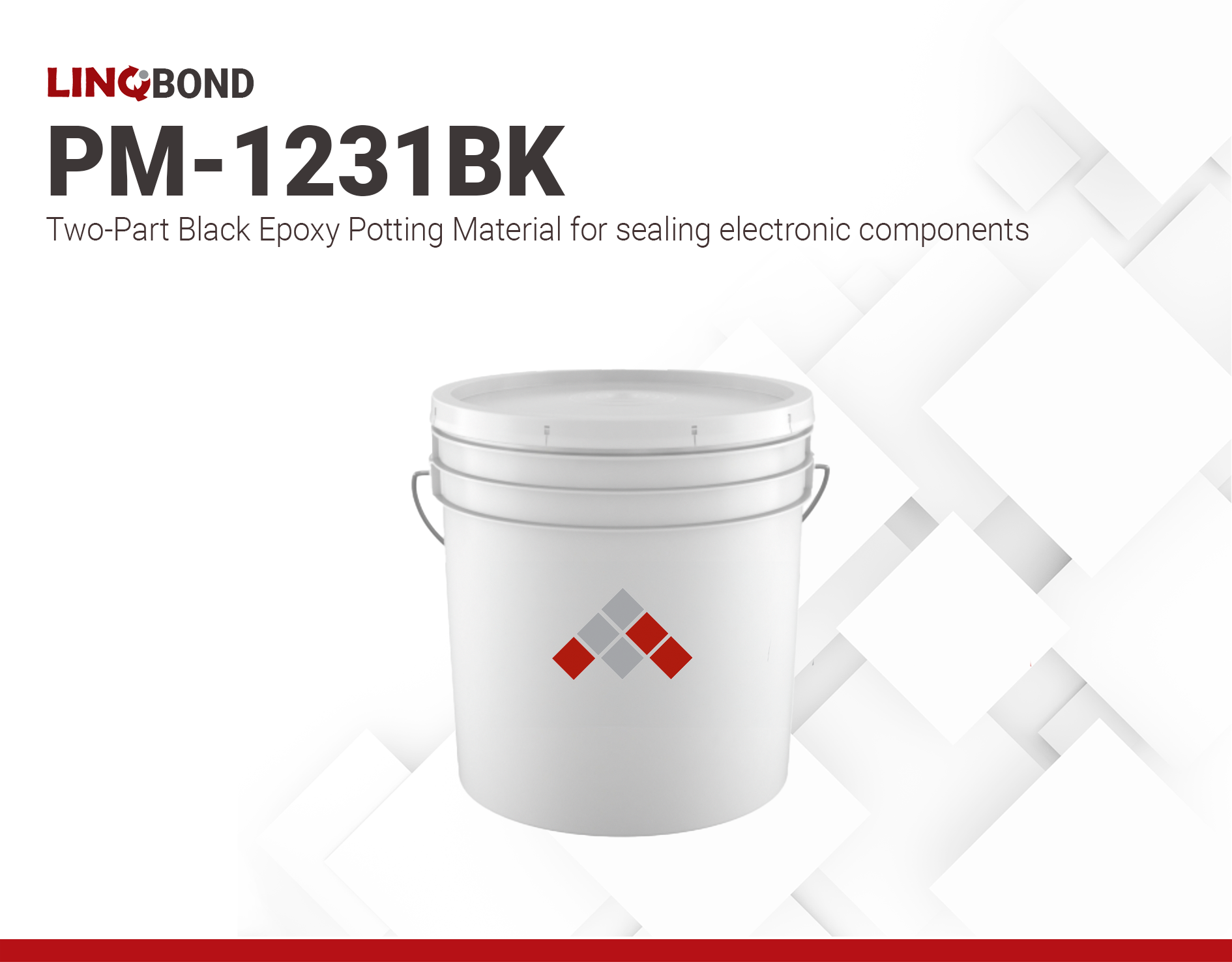LINQBOND PM-1231BK | Two part black epoxy potting material
- High resistance against weathering, aging, and UV radiation
- Non-corrosive, insulating, moisture-proof, and shock-resistant
- Solvent-free, environmentally friendly, and low in carbon footprint
Product Description
LINQBOND PM-1231BK is a two-component potting epoxy designed for casting, bonding, and sealing electronic components. It boasts outstanding aging and moisture resistance, excellent electrical insulation, high hardness, and a high breakdown voltage. Moreover, PM-1231BK offers customizable viscosity to meet application requirements. Additionally, PM-1231BK offers exceptional weather, UV, and shock resistance, while remaining non-corrosive and environmentally friendly.
LINQBOND PM-1231BK is well-suited for potting high power electronic components and modules that require high heat dissipation and flame retardancy. LINQBOND PM-1231BK is the opaque version of LINQBOND PM-1231.
Technical Specifications
| General Properties | |
| Chemistry Type | Epoxy |
| Density (g) | 1.8 g/cm3 |
| Mix Ratio Mix Ratio The amount of a constituent divided by the total amount of all other constituents in a mixture | 5:1 |
| Pot Life Pot Life Pot life is the amount of time it takes for the viscosity of a material to double (or quadruple for lower viscosity materials) in room temperature after a material is mixed. It is closely related to work life but it is not application dependent, less precise and more of a general indication of how fast a system is going to cure. | 1 hours |
| Thermal Properties | |
| Operating Temperature | -40 - 90 °C |
| Thermal Conductivity Thermal Conductivity Thermal conductivity describes the ability of a material to conduct heat. It is required by power packages in order to dissipate heat and maintain stable electrical performance. Thermal conductivity units are [W/(m K)] in the SI system and [Btu/(hr ft °F)] in the Imperial system. | 0.7 W/m.K |
| UL 94 Rating UL 94 Rating Flammability rating classification. It determines how fast a material burns or extinguishes once it is ignited. HB: slow burning on a horizontal specimen; burning rate less than 76 mm/min for thickness less than 3 mm or burning stops before 100 mm V-2: burning stops within 30 seconds on a vertical specimen; drips of flaming particles are allowed. V-1: burning stops within 30 seconds on a vertical specimen; drips of particles allowed as long as they are not inflamed. V-0: burning stops within 10 seconds on a vertical specimen; drips of particles allowed as long as they are not inflamed. 5VB: burning stops within 60 seconds on a vertical specimen; no drips allowed; plaque specimens may develop a hole. 5VA: burning stops within 60 seconds on a vertical specimen; no drips allowed; plaque specimens may not develop a hole | V-0 |
| Electrical Properties | |
| Dielectric Strength Dielectric Strength Dielectric strength is measured in kV per mm and is calculated by the Breakdown voltage divided by the thickness of the tested material. Those two properties go hand in hand and while Breakdown voltage is always thickness dependent, dielectric strength is a general material property. As an example, the dielectric strength of Polyimide is 236 kV/mm. If we place 1mm of Polyimide between two electrodes, it will act as an insulator until the voltage between the electrodes reaches 236 kV. At this point it will start acting as a good conductor, causing sparks, potential punctures and current flow. | >25 kV/mm |
| Volume Resistivity Volume Resistivity Volume resistivity, also called volume resistance, bulk resistance or bulk resistivity is a thickness dependent measurement of the resistivity of a material perpendicular to the plane of the surface. | 1.2x1015 Ohms⋅cm |
| Chemical Properties | |
| Moisture absorption | 0.15 % |
Additional Information
Processing Instructions
- Before potting, make sure the surface is clean. Remove any oil or dust.
- Mix component A and B according to specified ratio. Stir thoroughly to ensure uniformity while preventing air to be introduced into the mixture. Automatic mixing and filling machine can be used. Scrape the sides of the container to ensure even mixing until the color is consistent throughout.
- Use the mixture within 30 minutes.
- Allow the potted workpiece cure at room temperature until the surface is dry. Full curing typically occurs within 48 hours. The curing process is influenced by temperature variations; generally, higher temperatures result in faster curing, while lower temperatures lead to slower curing.
Precautions for Use
- Before use, thoroughly mix Part A. Stratification may occur during long-term storage due to its high specific gravity. Mixing ensures consistent product performance. Do this in a well-ventilated area.
- Use all of the mixed Part A and B at once. Seal and store any components for future use.
- Typically, keep the potting thickness within 30mm. For deeper potting, contact the manufacturer for guidance.
Please note that the provided information is based on available data and typical conditions. For specific applications and detailed test results, refer to the actual test data and conduct appropriate certifications.
Storage and Handling
The product can withstand long-term exposure to fresh water, sewage, waste water, calcium carbonate aqueous solution, detergent, low-acid, and corrosive water solutions. It has short-term resistance to mineral oil, vegetable oil, fat, and fuel. However, it is not resistant to organic solvents, paint thinners, high-concentration acids, or alkalis.
Store in a ventilated, dry, and clean environment at 10–30 °C. Keep away from fire and heat sources. It is strictly forbidden to store in outdoor environments. At proper storage conditions, Part A and Part B has a shelf life of 6 months. Shelf life can be extended by using cold storage.



